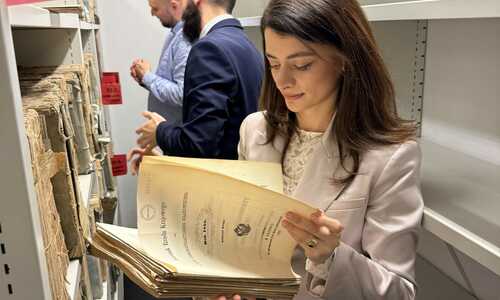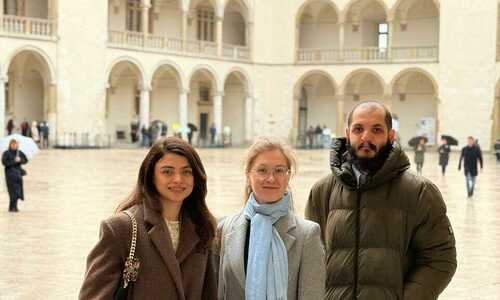Galleries
Visit of SabaUni lecturers under the Erasmus+ program

From March 10-14, 2025, the Faculty of Communication Sciences (FCS) had the honor of hosting lecturers from the Faculty of Social Sciences at Sulkhan-Saba Orbeliani University Nani Manvelishvili and Irakli Nodia. The visit took place within the framework of the Staff Mobility for Teaching (STA) Erasmus+ KA171 program.
During the classes conducted for the students of Żaneta Wełna, PhD, Irakli Nodia introduced the history of Polish-Georgian relations, particularly emphasizing the support of Poles in the Georgian struggle for independence. Nani Manvelishvili conducted a lecture and workshop on Soviet propaganda posters designed to shape the vision of women. The use of the poster as a tool of propaganda was also the topic of the workshop, during which students, analyzing American posters, among others, learned about the methods of manipulation used in propaganda messages.
Nani Manvelishvili met Olga Nadskakula-Kaczmarczyk, PhD, DSc also conducting research on Russian propaganda, to discuss prospects for scientific cooperation.
ICO extends special thanks to Aleksandra Urzędowska, PhD for her assistance in organizing classes and meetings with FCS research and teaching staff.
Our guests had the opportunity to visit various corners of the university, starting with the historic rectorate building at 25 Kanonicza Street and ending at 1 Franciszkańska Street. Aleksandra Mirek-Rogowska, PhD, showed the Georgian guests around the Academic Media Center and the recording studio of “Radio Bonus”, presenting the university's activities in the field of media education. The visit to the Office of International Cooperation was combined with a tour of the UPJPII University Library, and a visit to the exhibition “Treasures of the Krakow Chapter,” presented by Joanna Świtała.
ICO organized a cultural program in which guests had the opportunity to visit the interiors of the Royal Palace on Wawel Hill and the exhibition “Siłaczki” (Eng. “Strong Women”), bringing closer the role of women in shaping the history of Krakow. The exhibition, the theme of which corresponded to the scientific interests of Nani Manvelishvili, became a pretext for gaining knowledge about Polish women activists and artists in the context of political and cultural changes.















